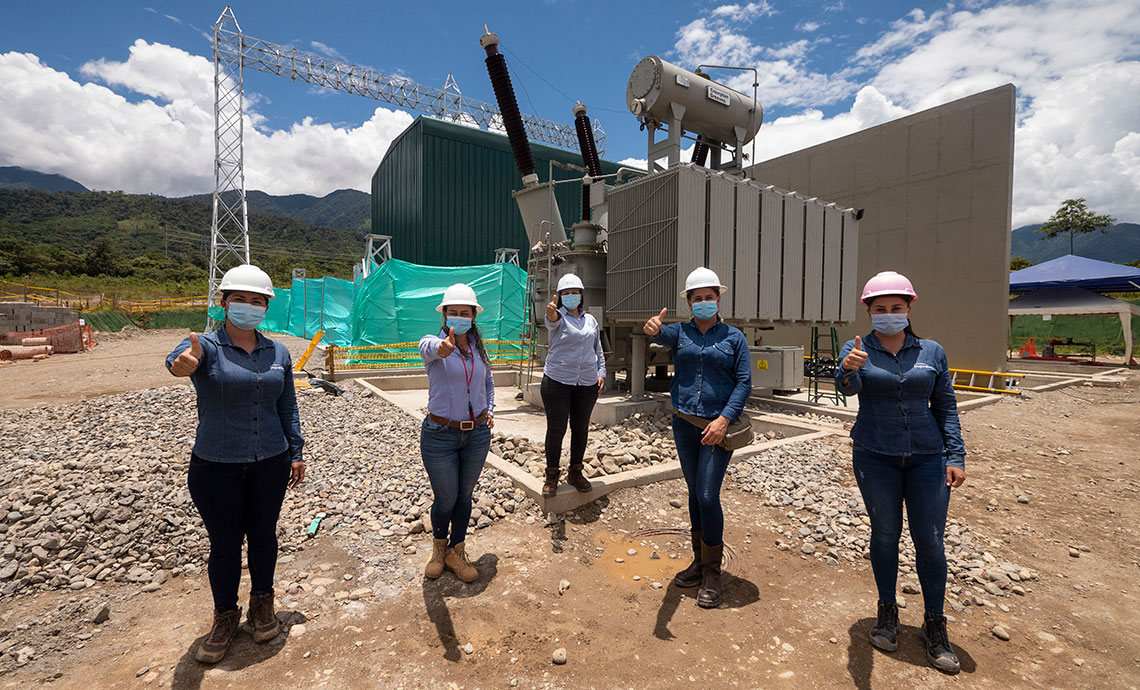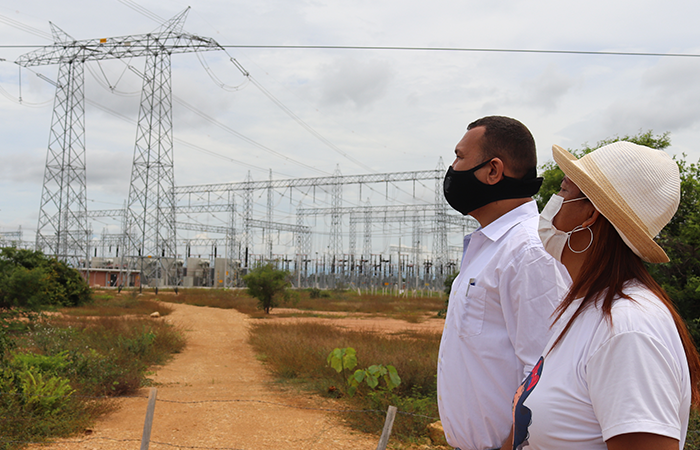
GEB employees at the new substation in Mocoa, Putumayo

GEB employees at the new substation in Mocoa, Putumayo
A top priority at Grupo Energía Bogotá is that all our employees must safely return home every day, and that they are able to enjoy free time with their families. To this end, we have in place an efficient and comprehensive Occupational Safety and Health program that informs about the inherent risks of each activity and their corresponding control measures, and that raises awareness on safe behaviors.
We place special emphasis on planning of work and the verification of the environmental conditions to ensure fulfillment of the control measures and the culture of prevention to ensure optimal self-care.
In line with our first cultural attribute, we established annual goals that enabled us to measure Occupational Safety and Health performance at all Group companies, with special emphasis on the proactive performance indicators of Occupational Safety and Health (OSH). We also have strategies in place that enable the organization to identify the main risk factors to document, communicate and adequately manage them.
In 2020, the importance of this topic multiplied three-fold. It was a year of major challenges due to the pandemic, which transformed the everyday lives of our employees to protect their health and well-being. This involved a shift in our needs and priorities, quick adaptation processes, the definition of a COVID-19 strategy, and other key actions to protect lives.
At GEB, we determined that a strategic objective was to move forward in consolidating an OSH culture (CSP objective 07 - 2020: ‘Strengthen the Occupational Safety and Health Culture - Vision Zero’), where caring for life is incorporated as a corporate value in the DNA of all Group affiliates.
We established that this initiative should be pursued by means of a long-term process with assistance from a world-class partner, which provides advisory and consulting to GEB and its affiliates on operating risk controls, diagnosis, design and implementation of a program to improve the occupational safety and health culture to prevent work accidents, and the culture of self-care for all Group employees (Transmission and GEB corporate). We incorporate the best practices to enable us to move forward in the scale of safety to reduce the accident rate in a sustainable manner over time and to materialize the vision of zero accidents.
(403-1) (403-8) We have on OSH Management System that covers all employees and contractors at all work centers of Grupo Energía Bogotá. (403-2) We also have several processes to periodically identify occupational hazards and assess risks, as follows:
GEB: Hazard identification matrix, assessment and valuation of occupational safety and health risks, to establish the preventive and corrective actions aimed at improving working conditions.
TGI: Risk matrix and hazards at each work center (districts, administrative and compression stations), establishing all the operating risks and controls at each center.
Cálidda: Hazard and risk identification matrix, which is reviewed at least once a year or whenever changes are made to facilities, equipment, work procedures, regulations, or others.
Contugas: Hazard identification, risk assessment and control matrix is developed, associated with each profile’s duties and activities.
Trecsa: Matrix for risk identification and assessment and determination of controls. Work permits and safe work analysis. Safety meetings before starting to work. Reports on unsafe conditions, acts and incidents.
Electro Dunas: Identification of hazards and assessment of risks (IPER, for the original in Spanish), review of risks, training and education.
(403-3) As a Group, we have occupational risks assistance services that promote and control our employees' health to ensure their physical, mental and social well-being and to protect them from occupational risk factors.
(403-6) Our company offers economic benefits to provide employees access to additional health care plans. Specifically, GEB employees covered by the Collective Bargaining Agreement receive the benefit of 100 % prepaid medicine, which provides access to a comprehensive health care plan for their family group.
(403-3) During 2020, at TGI the intervention focused on the implementation of actions in the following lines:
Epidemiological Surveillance Systems (SVE) Musculoskeletal: workstation inspections, recommendations and intervention workshops
Psycho-social: talks on mental health, grieving interventions, handling of stress and confinement, among other topics.
Healthy life habit programs: healthy eating habits, family time, anxiety management.
Public health: prevention of COVID-19 contagion, prevention of breast and prostate cancer, and of sexually transmitted diseases (all on-line).

In january 2021 we completed three consecutive years with no fatal accidents at the group and its affiliates.
(403-9) Zero fatal accidents in the operations of the Group and its affiliates: three consecutive years with no deaths.
Accidents with lost time decreased by 18.7 % compared to 2019, including employees and contractors.
We delivered a workshop on Safety Vision, led by the Group’s CEO with the participation of Senior Management. At this event, we prioritized the strategic lines for transformation, approved the Governance Committee for the OSH Cultural Transformation project, and defined the performance and proactive indicators.
A 10 % of direct employees were infected by COVID-19. None of them suffered serious complications.
Nearly 85 % of employees worked at home, with tools and systems facilitated by the Group. We also provided advice on setting up an ergonomic environment and provided psychological assistance with support from the occupational risk insurer (ARL, for the Spanish original).
We systematically structured the remote work model in compliance with applicable regulations.
(403-5) At the Group and its affiliates, we trained over 90 % of our employees and contractors, both through face-to-face and e-learning sessions, on OSH topics such as COVID-19 hazards and risks, visible leadership, dissemination of biosafety protocols, adapting to work at home, responsibilities of the employer-employee OSH Committee (COPASST, for the Spanish original), preparation of emergency brigade members to provide first aid with COVID-19 safety measures, emotional well-being, ergonomics at work, and other topics.
At TGI, 100 % of contractors received OSH training during 2020: We discussed policies, procedures and other tools available at the Company to manage matters related to occupational safety and health.
In the process of strengthening the Occupational Safety and Health culture, at TGI, we conducted 330 surveys and 14 employee interviews, as well as 400 surveys and 23 interviews with contractors. We also reviewed 52 documents of different management systems at TGI. With these inputs, we made a diagnosis of the OSH culture, including a series of recommendations that will become actions plans to be developed during phase II of the project (February 2021-August 2022).
Cálidda was a contestant and received recognition for the Rímac project Application of Business Intelligence in Occupational Safety and Health, which enables the effective management of the employees’ risks and the reduction of accident rates through the digital and cultural transformation.
In January 2021, we began to implement the Vision Zero Accidents model to continue strengthening our OSH culture.
Implement the Healthy Company project, which was postponed in 2020 because we were forced to focus on topics related to COVID-19 response.
Ensure that in 2021 we continue to maintain the result of zero accidents in the operation and continue the systematic reduction accidents with lost time.
Reduce by 10 % the lost time incident frequency indicator (LTIFI).
Develop strategic actions in the telecommuting model that foster a good work environment, as well as structure and define the viability of other work arrangements, such as mobile offices and alternating.
In the medium term, strengthen and consolidate the OSH culture through a plan structured based on world-class best practices, under the Vision Zero Accidents Model. Its duration will be 18 months and will contribute to the Company’s operating excellence, and consequently to the creation of value.
In the long term, our challenge is to become the benchmark for the OSH culture in Latin America’s energy industry.